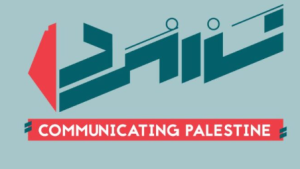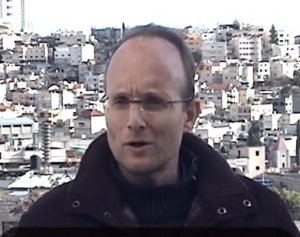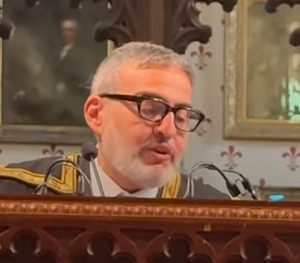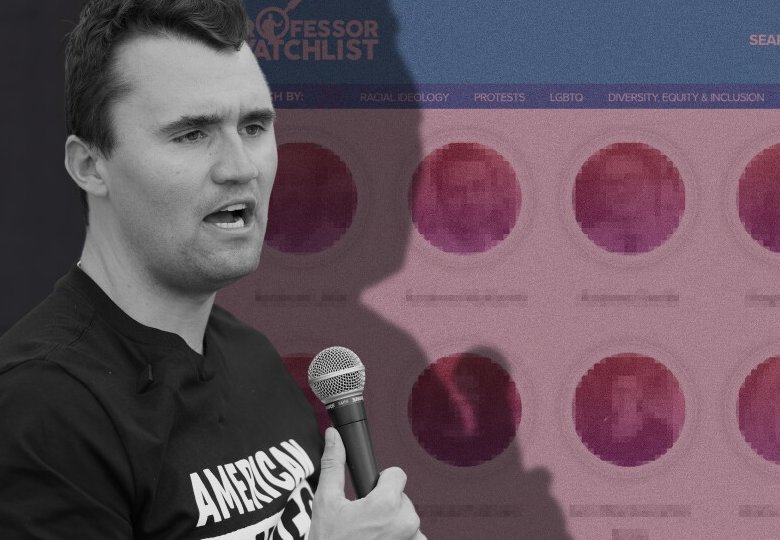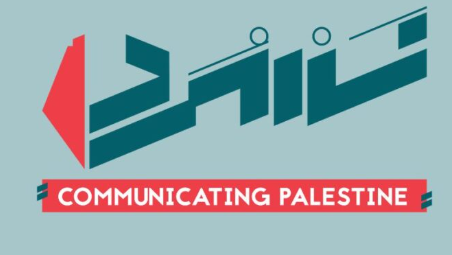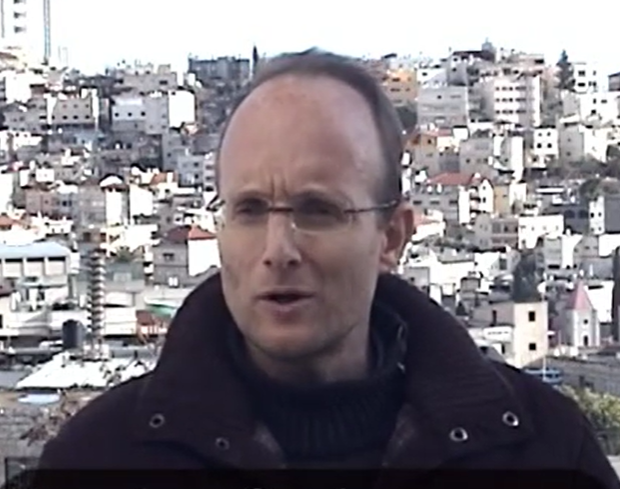17 September 2025
President Trump and others are describing Charlie Kirk as a tolerant figure who visited college campuses simply in order to debate “leftist” students: a model for democratic America and a threat to “radical left” Democrats who know only hatred and violence. You will appreciate that this is nonsense, but you may not know just how dangerous he was. This report from The Chronicle of Higher Education gives a good indication.
Charlie Kirk’s Watchlist Made Some Professors’ Lives a ‘Living Hell’
By Katherine Mangan and Jasper Smith September 15, 2025

For Tobin Miller Shearer, a professor of history at the University of Montana who had received death threats after being placed on a Turning Point USA target list, news of Charlie Kirk’s murder on a college campus in Utah prompted a flood of emotions. “I cried for our nation, for what this will mean for his family, for all the harm he did in his life, for all of us,” he said. “It was a horrible moment in all of its complexity.”
After those threats, Shearer moved his class on the history of white supremacy to a secret location, with a campus police officer on guard. “I did not want any threats on my life to ripple out and affect my students,” said Shearer, who heads Montana’s program in African American studies.
Shearer was one of hundreds of professors whose lives had unexpectedly intersected with Kirk’s when their names ended up on Turning Point USA’s Professor Watchlist.
Kirk created the watchlist in 2016 as a signature product of his new nonprofit. Its mission, it says, is to “expose and document college professors who discriminate against conservative students and advance leftist propaganda in the classroom.” It’s based on published news stories about “radical” behavior by professors, but also informed by recordings leaked by students and tips from the public.
The publicly searchable database has grown to more than 300 professors, who are grouped into categories including diversity, equity, and inclusion, climate alarmist, feminism, abortion, terror supporter, racial ideology, and LGBTQ.
The Chronicle spoke to more than a dozen professors who, like Shearer, ended up on a list that exposed many of them to doxxing and threats. As the examples below show, Kirk’s death conjured up mixed emotions ranging from empathy for his family to contempt for his ideas. It also elicited frustration over how the country is mourning his death.
‘So Much Hypocrisy’
David S. Cohen, a professor of law at Drexel University, was placed on the list because of his outspoken pro-choice scholarship and views. Cohen’s scholarship examines how law impacts abortion provision and violence against abortion providers.
“See, Charlie Kirk was a good guy who should be honored because he valued free speech,” Cohen wrote on Facebook last week. “So much so, in fact, that he put me and many of my friends and colleagues on his Professor Watchlist. No, not because he wanted us targeted — why would you think that you cynical fool?! Rather, because he was being so kind and thoughtful to highlight our work for his rabid, highly-armed rightwing extremist audience. I’m so grateful for all he did to promote us to this new group of people!” In an interview, Cohen said he won’t celebrate anyone’s murder, but that people shouldn’t forget what Kirk did when he was alive.
“There’s been so much hypocrisy with how his death’s being covered,” he said. “He’s being touted as this paragon of free speech who just wanted to engage with people who disagree with him. In fact, he was behind a website that targeted those who he disagreed with and broadcast information about us to his extremist readers with the clear intention that they should take some kind of action against us.”
Cohen said he was also alarmed that people are being fired for comments they made publicly about Kirk’s death that were viewed as being unsympathetic. “They weren’t lionizing him the way we’re apparently supposed to,” he said.
‘It’s Open Season’
Albert Ponce, a professor of political science at Diablo Valley College, a community college in California, ended up on the watchlist after a 2017 public lecture on white supremacy in the United States was edited down to a two-minute clip and circulated on conservative media outlets, starting with a right-wing site called Red Elephant.
“It ended up on Fox and Breitbart. Once it hit that ecosystem, it was gone,” he said. Hate mail turned into death threats against him and his family. Pictures of his family, including his then 9-year-old daughter, appeared online. He told a public radio show that he stopped letting her open the mail.
College administrators were flooded with demands that he be fired.
Now a tenured professor, Ponce said he has no intention of backing down from his scholarship, but he understands why many of his colleagues are worried that with Kirk’s death, the attacks on scholars could escalate.
“Now in this moment for what we teach, our areas of expertise, we’re all targets for these organizations that try to silence us,” Ponce said. “For anyone who touches these issues now, it’s open season.”
‘Greatest Stress of My Life’
Saida Grundy, a professor of sociology and African American and Black diaspora studies at Boston University, said she experienced “epistemic terrorism” as a result of being on multiple professor watchlists, including Turning Point USA’s.
Grundy first appeared on conservative watchlists in 2015 as an incoming professor to BU for her tweets calling white male college students a “problem” for America’s colleges.
Grundy said she received countless death threats and demands that the university fire her. In her first year on the faculty, her office was broken into and vandalized, she said.
“It was the greatest stress of my life, and I literally was just coming off having stage-three breast cancer,” Grundy said. “It was far more stressful than the cancer, far more stressful.”
Grundy said her reaction to Kirk’s death wasn’t celebration, but indifference: “I really take issue with this idea that … I could be made to mourn a person who wanted to deny my right to exist.”
‘A Complicated Political Legacy’
David Austin Walsh, an academic adviser at the University of Virginia, said that while he was initially intimidated, being added to the watchlist had little effect on his career or safety. Walsh was added to the list in 2020 when he tweeted “Americans don’t need to just ‘protest.’ They need to actively topple the government,” in response to the presidential election.
“The default target for TPUSA and their political allies … tends to be faculty of color, women, and then other people in what they perceive to be vulnerable positions,” Walsh, who is white, said. “The efficacy of the professor watchlist in making a faculty member’s life a living hell is deeply connected to that.”
Walsh was teaching a class on the American far right when he learned of Kirk’s shooting. When his students asked him to discuss the event in real time, Walsh declined, in fear that he would face political backlash. Walsh said his own feelings on Kirk’s death are complicated.
“Any honest attempt to grapple with Kirk and his political legacy has to grapple with … the degree to which he contributed to the ongoing degradation of our civil society and political culture and the normalization of violence in that culture,” Walsh said. “Which is not to say that he deserved what happened to him, but it is a complicated political legacy.”
‘He Was Also a Human Being’
Matthew Boedy, a professor of rhetoric at the University of North Georgia, also ended up on the professor watchlist because of an opinion piece he wrote in 2016 challenging a bill, which has since become law, allowing concealed firearms on college campuses. He has gone on to dedicate much of his research to the role that Kirk and Turning Point USA have played in, what he calls, in a book coming out in a few weeks, “the dangerous plan to Christianize America and destroy democracy.”
He learned the news of Kirk’s death while he was driving. “I gripped the wheel and tried not to drive off the road,” he said. “As much as he was a public figure and larger-than-life influence on our nation, he was also a human being.”
Boedy said he was shocked “not only because of the brutal nature of the crime, but also the fact that it happened on a campus where we want ideas to flow freely.” He worries about Kirk being portrayed as a martyr, which he said “gives approval to a lot of retribution and payback.”
“Viewing Kirk as a martyr,” he said, “is a flashing red light for our democracy. I would not want his death used to further the culture war that he was raging.”


